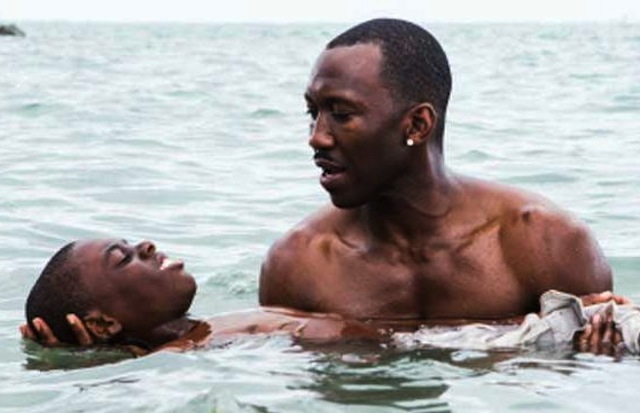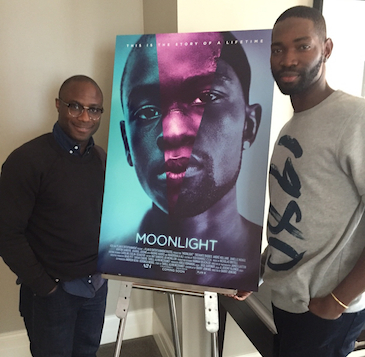CHICAGO – Patrick McDonald of HollywoodChicago.com appears on “The Morning Mess” with Dan Baker on WBGR-FM (Monroe, Wisconsin) on March 21st, 2024, reviewing the new streaming series “Manhunt” – based on the bestseller by James L. Swanson – currently streaming on Apple TV+.
Interview: Barry Jenkins & Tarell McCraney of ‘Moonlight’
CHICAGO – One of the biggest buzz releases of recent weeks is the brilliant new film “Moonlight,” directed by Barry Jenkins, from a story by Tarell McCraney. The narrative, structured in three parts of one boy-to-man’s life, is an emotional journey that connects to important empathy and a vital passionate heart.
The film features Mahershala Ali, André Holland and Naomie Harris, and follows the pathways of character called Little/Chiron/Black (he has different names in each segment of his life). He is a unique soul from a desperately poor African American neighborhood in Miami, and knows that he is gay, but has that life challenged at many levels. Director Barry Jenkins and story originator Tarell McCraney was in Chicago recently to promote the film, and talked with HollywoodChicago.com.

Watch the Water: Little (Alex Hibbert) is Uplifted by Juan (Mahershala Ali) in ‘Moonlight’
Photo credit: A24
HollywoodChicago.com: What is the origin of this story, and the evolution of your collaboration on it?
Tarrell McCraney: It actually began in Chicago in 2003. I had just graduated from the DePaul University here, as an acting student, and I wrote a story about my childhood. I keep trying to figure out the exact moment that happened, but there was a confluence of events that occurred. My mother had just passed away, after having contracted full-blown AIDS, and I felt guilty that I wasn’t at her deathbed. At the same time, I was heading to a graduate program at Yale, and I was invited to do a piece with another director.
I was at a crossroads, and didn’t know what to do. Within the guilt of my mother’s death, I was trying to figure out what to do. The story that resulted was ‘In Moonlight, Black Boys Look Blue,’ in which I was poetically trying to work out those chances or turns in my life, as if I’d chosen certain paths. So many of the events were based on real life, and my ‘guess-timation’ of what might have been.
HollywoodChicago.com: That was 13 years ago, how did the piece evolve from there?
McCraney: I put it aside, and wrote seven plays after that. I had done a new version in grad school, to kind of consolidate the events, and that version ended up with a theater group in Miami, who were putting together works from Miami natives. One of the other pieces was from Barry Jenkins, who was doing a work called ‘Chlorophyll,’ and that’s when we met.
HollywoodChicago.com: I heard you grew up in the same neighborhood in Miami, where the film is set, but had not encountered each other while there?
Barry Jenkins: Yes, the same. Liberty City. When the producers of the Miami theater group read ‘In Moonlight, Black Boys Look Blue,’ they thought of me. That’s when we started having a cross country conversation, as to what the adaptation would look like.
HollywoodChicago.com: The unique three part view of the two main characters had to daunting when it came to casting. How did one part of Little’s life, cast first, inform the other parts in the actors you chose subsequently?
Jenkins: The order that we chose them in was Chiron in the second story [Ashton Sanders], Black [Trevante Rhodes] in the third part, and Little [Alex Hibbert] last. Ashton was the first guy to read for me, and we kept considering him as the process went on. What ended up happening is I was trying to read the chemistry, pairing off the various points in his life with other actors at those points – third story Black with third story Kevin, etc. As I went on, that became a mistake. What I ended up doing was finding the actors through their soulfulness, a soulful second story Chiron and Kevin. That’s where it came together.
HollywoodChicago.com: For both of you, there are many complexities to African American men who happen to be gay. What struggles in the gay rights movement do you find to be different for AA men, let’s say from the Stonewall Inn riots in 1969 to the present day?
McCraney: I don’t know if I can specifically answer that question, because if I could I wouldn’t be sitting here, I’d be out solving the problems. [laughs] One of the things that is problematic in all civil rights is that we put people in silos. We silo gay rights from broad civil rights and black lives from the other human rights issues. If we all could have equal protection under the law, that would be a solution.
I often have to remind people that the Stonewall riots began because transgender persons of color began it. That is so overlooked in the retelling of the events, because we tend to demonize those persons. Also, what I think is different about persons of color is that they are asked to pick just one letter in the LBGTQ spectrum. And I think that is a dangerous thing to ask somebody, to pick an allegiance. It’s like asking, which would you rather be, the hammer or the nail. Either way, you get hurt.
HollywoodChicago.com: What did you both love about Little and Kevin that you think came out in the magic of their journey?
McCraney: I rarely get to talk about Kevin, so I’m going to talk about him. The real ones in my life, and the character. Kevin is the type of person you meet in your life that no matter how well you think you know yourself, he knows you better. He’s always been there, and you look at him and think, ‘why do I have such room for you in my heart and psyche, and why do you have room for me?’ When you find that person in your life, it’s difficult to let loose of them. Even though they are no longer around you, they serve a purpose. I love that about him.
Jenkins: I also love Little in his way. People sometimes characterize him as a weak or ineffective character, but I think he’s really strong. He’s gone through a lot, but never really gives up. I’ll speak a bit about the process of telling the story, with all three of the actors. They all brought that strength to a character that seems inactive, but working with them I found so much going on. We’re just used to lips flapping, and often don’t note there is something else really going on.
HollywoodChicago.com: Well, he does baptize himself at one point in the second story?
Jenkins: It’s interesting that you mentioned that…there are actually three baptisms taking place throughout the journey. There is a point where we see Little boiling water for a bath, he takes on that chore himself. To have the strength to say, I’ve had a day, I need a bath, and we don’t have hot water, so I will boil it. That is active.
HollywoodChicago.com: Both Kevin and Little are in a lower middle class, even poverty situation, and both deal in the criminal and drug element of that poverty. How instinctively do you think they best survive to meet again?
 Barry Jenkins & Tarell McCraney in Chicago Photo credit: Patrick McDonald for HollywoodChicago.com |
McCraney: I think the character Black [adult Little] has adapted in this way, that allows him to survive. He subverts an aspect of his identity, number one, and also takes on the persona of a masculine role model that was once nurturing to him. He does it in some ways incorrectly, but he’s performing it, and the performance gives him a way to survive. Kevin eventually is a working class person, and enjoys what he does. I love that we get to him, and he’s a working man by then, and has flipped what we saw when he was a teenager.
HollywoodChicago.com: It’s interesting that you mentioned the role model named Juan, that Little had in Part One, who was such a strong character. He does go away, so how were you able to leave him behind?
McCraney: Barry picked it up in an intuitive and visceral way, how people come into your life like that, and sometimes they just go away.
Jenkins: And I did want the audience to know what that feels like. To feel the same way you felt. What happened to him?
McCraney: Say what you will about the transition from Little to Black, but what Ashton [the actor in Part Two] brings in, is that you could see Juan within him, without seeing it. He carried that loss with him. I think his daydreams involve that loss, while Kevin plainly opines that his daydreams involve having sex with men.
HollywoodChicago.com: How do you see this film as a bridge in creating understanding both about the African American journey in that lower middle class world, and the gay relationship that it fostered?
McCraney: There is intersection in the piece, period. Is it necessarily a bridge? I don’t know. You can put two points together over a body of water, but people have to get on the structure for the two points to meet. We can create something, but the people have to come onto it.
Jenkins: While doing Q&A screenings in New York City, not associated with festivals, I observed people afterward start talking about the film while they’re waiting on the subway platform, and comparing the issues they saw and experienced. So if there is a bridge to be built, it’s people sharing the common expression of the film, and then giving their perspective on what they’ve just seen. In that way, maybe the film can function as some sort of bridge – but that was not the intention, and it’s not the point.
For the 4.5/5 star review of “Moonlight,” by Patrick McDonald of HollywoodChicago.com, CLICK HERE.
For an interview of actress Naomie Harris of “Moonlight,” by Patrick McDonald of HollywoodChicago.com, CLICK HERE.
For an interview of actor André Holland of “Moonlight,” by Patrick McDonald of HollywoodChicago.com, CLICK HERE.
 | By PATRICK McDONALD |


